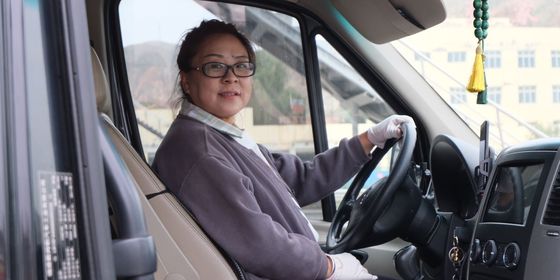From impatient instructors to common mistakes on the road, here’s a language guide to driving in China
In October 2021, when traffic police pulled over a driver on the highway in Hebei province, the man had a novel excuse for not carrying a license or ID card: He claimed he was an alien from outer space.
Sadly for the driver, the officers only reminded him that everyone needs a license to drive in China, no matter what planet they come from, so they fined him 1,000 yuan and detained him for several days.
Luckily, almost everyone else on the road in China does have the proper documentation and training to get behind the wheel. According to the Ministry of Public Security of the PRC, China granted over 20 million driver’s licenses over the past nine months alone, with the total number of licensed drivers nationwide reaching over 461 million by the third quarter of 2022.
Driving schools, then, have no shortage of business as they work to churn out licensed drivers. Like in many countries, learning to drive is a rite of passage to adulthood for youngsters in China, though passing the exams is not always simple. Trainees need to learn the traffic rules, various driving maneuvers, and safety procedures, while instructors (驾校教练 jiàxiào jiàoliàn) have to be innovative, patient, and tolerant to improve their students’ skills.
Anxious start
The first step of obtaining a Chinese license is an exam of 100 multiple-choice questions, mostly on traffic rules. You are required to answer 90 percent of them correctly to pass. Then it’s time to get driving, with an instructor sitting beside the trainee as they practice parallel parking, hill starts, and emergency stops. Instructors require patience and clear lesson-planning to help their charges learn:
Pay attention, I’ll take you through the whole process, then you’ll do it yourself.
认真看,我就演示一遍,等会儿你来开。
Wear your seat belt, adjust your seat and rearview mirror, hit the brake pedal, press the clutch, put it in gear, lower the handbrake, release the clutch slowly, and then loosen the brakes.
上车先系好安全带,调整座椅和后视镜,拉手刹,踩刹车,离合放到底,挂一挡,松手刹,松离合到半联动状态,松刹车。
For rookies, this can be overwhelming. Along with the mechanical processes of driving, learners also need to become adept at identifying road signs and obstacles, switching on their turn signals, and controlling their speed. Sometimes it leaves them floundering:
If I pull the handbrake handle first, how about the clutch? When should I turn the steering wheel to full lock?
上来就拉手刹,离合呢?哪个点位方向盘要打死来着?
Sometimes, even the instructors lose patience with struggling students who seem incapable of understanding basic maneuvers no matter how many times they’re reminded.
Steer the wheel to the right. I said right! Why are you still turning left?
向右打方向盘,向右,我说的是向右,你怎么还往左呢?
The engine stalled again. How many times have I told you to lift the clutch gently?
你这个车又熄火了,说了多少次轻抬离合。
Gifted rookies
Some lucky newbies, however, take to driving with ease. These talented individuals are known as 天赋型选手 (tiānfùxíng xuǎnshǒu, naturally gifted competitors). Of course, they are also a source of annoyance to other new drivers still struggling to find the biting point of the clutch during their 10th lesson. But if you ever try to ask them for advice, such as:
Why does the car always end up crooked when I reverse?
倒库我为什么每次都会偏一点儿啊?
How do you drive through that “S” curve? I cross the line every time.
S弯你是怎么走的啊?我每次都会压线。
How do you avoid stalling on a slope?
你是怎么做到坡道不熄火的?
…you’ll find these “natural drivers” rarely have an answer:
It’s just instinct.
凭感觉就行了啊。
“Humorous” instructors
Learners end up spending a lot of time with their instructors, so finding one with an easygoing personality is essential for a smooth learning experience. Leaving empty parking lots and hitting the roads for the first time, or entering a highway and accelerating up to 80 kilometers per hour and beyond, can be frightening for beginners, though some instructors (having seen it all before countless times) may have little time for such anxiety.
Student: Coach, I can’t, this is too fast!
不行不行,教练这车太快了!
Instructor: You’re still going slower than that e-bike!
你现在还没人家电动车跑得快!
But when you finally find the courage to floor the gas pedal and accelerate, you ought to stay alert. Even on the empty training roads, accidents can happen. Remember to check your side mirrors and slow down before turning. With bumping into fences, scraping walls, and even rear-ending other cars common in the school practice yard, you’ll soon find yourself thinking:
I finally know why the driving school looks so run-down.
终于知道驾校为什么这么破了。
Under the pressure of all the new information, beginners inevitably make basic errors; mixing up their left and right or accidentally running red lights, for example. Some instructors are not so sympathetic to such mistakes:
You don’t stop at red lights, and you don’t move once they’re green. Is it because you don’t like either color?
红灯你不停,绿灯你不走,怎么了?是没有你喜欢的颜色吗?
Such quips are perhaps instructors’ way of putting their students at ease. In fact, driving coaches have gained a reputation for making witty comments and have become known for their humor.
Every qualified driving instructor has a dream of becoming a stand-up comedian.
每一名合格的驾校教练,都有一个说相声的梦想。
Even in emergencies, jokes from instructors may help ease the panic:
Student: Where should I put my foot after braking?
踩了刹车,脚放哪里?
Instructor: In your pocket.
揣兜里。
Coaches are also known for their 阴阳怪气 (yīnyáng guàiqì, deliberately mysterious or sarcastic) methods of consoling worried learners:
Student: Coach, I’m so scared. I think I’m a “road killer.”
教练,我好怕,我觉得我就是个“马路杀手”。
Instructor: Nah, you’re a moving roadblock at most.
不,你顶多算个移动路障。
Student: Sir, I’m so nervous, what should I do next?
教练,怎么办,我好紧张啊!
Instructor: No need to be nervous, it’s the pedestrians who ought to be.
你不用那么紧张,该紧张的是路人。
Tricks of the trade
When you’re practicing inside the driving school, there are ways to game the system by judging distances and turning points via the environment. It could be a moss-worn brick, a conspicuous scratch on the road, an ancient cigarette butt, or a lonely patch of grass growing through the cracks in the paving that act as reference points (点位 diǎnwèi) for steering, accelerating, or indicating. Seasoned students might quip:
Each blade of grass in the driving school has its purpose.
驾校的每一棵小草都有自己的使命。
New drivers need to prepare themselves for driving in all road conditions, be it heavy traffic, rain, or night driving. Since anything can happen on the road, driving lessons continue no matter the weather:
Student: It’s raining today, so we won’t practice, right?
今天下雨就不练车了吧?
Instructor: Sure. In the future, you should ask for leave from work every time it rains.
以后下雨天你就别开车上班,请假算了。
Bumpy roads, too, need to be conquered by beginners:
Student: Coach, how about you drive this stretch?
要不这段儿你开吧,教练?
Instructor: So when you encounter bad roads in the future you’re going to get out and carry your car across?
难道你以后有车了,遇到烂路你要把车背过去?
For frustrated instructors, tolerance is key. Sometimes it’s best for teachers to take responsibility themselves rather than chastise the poor skills of beginners:
Student: Coach, did I just drive over the line?
教练,我是不是压线了?
Instructor: No, I drew the line crooked.
你没错,是我把线画歪了。
The dry, biting humor of instructors lends itself to some bizarre ”compliments.”
After seeing you hit the clutch like that, I think you’d be quite suited to flying an airplane.
你这个踩离合的技术适合开飞机啊。
Of course, when it finally comes to the practical exam, not everyone passes on their first try. Often, despite the weeks of practice and drills, simple mistakes like speeding, poor parking, failing to check mirrors, or even not fastening one’s seat belt are to blame. Many people don’t pass the first time, a fact instructors urge their students to come to terms with:
Student: Coach, what should I focus on during the exam?
教练, 这次考试我要注意点儿什么呀?
Instructor: Just the date when you can retake the exam.
注意下次补考时间。
Ready to hit the road
But when you finally pass and get your license, congratulations are in order! Your instructor may still have final words of advice for you:
Student: Coach, I made it! I finally got my driver’s license!
教练,我过啦!我终于拿到驾照啦!
Instructor: Keep practicing, and drive safely.
拿到本儿多练练就好了,路上慢点儿开车。












